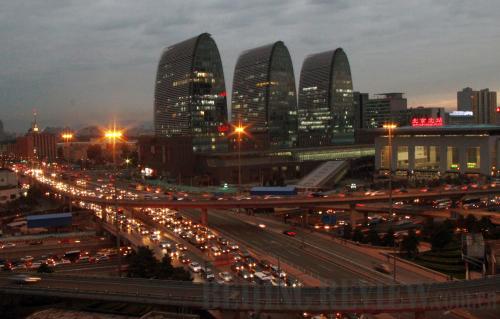|
 |
|
MISERABLE TRAVELLING: Beijing suffers heavy traffic congestion before the Mid-Autumn Festival (ZHAO WANWEI) |
Misused Knowledge
At a recent education forum, Professor Yang Yuliang, President of Shanghai-based Fudan University, severely criticized the phenomenon of university professors' moonlighting, making speeches and giving classes on and off campus.
It is not so terrible to see professors moonlighting. They are sometimes paid about 200,000 yuan ($29,850) just for attending a seminar, which is actually nothing compared with movie stars' high appearance fees.
Why is society worried about their moonlighting then? Most of them actually work for money. They speak in the way those who pay them want them to. By so doing, they are damaging the image and dignity of teachers.
Another terrible consequence is moonlighting, as a part-time job, takes up so much time that the professors don't have time to tutor their students. In some cases, postgraduate students under their tutorship reportedly cannot meet them even once a year.
Some professors, taking advantage of their privileges to assess academic achievements, take bribes from people and/or organizations that are eager for immediate fame.
Professors' active involvement in moonlighting is not a reflection of the power of knowledge. Instead of contributing to social and academic development, it disturbs regular teaching and research work in universities. What we need are mind-inspiring ideas, but not profit-oriented, coarse speeches.
Beijing Times
Education Stimulus
The urbanization rate in Wuqi County in northwest China's Shaanxi Province has jumped from 23.6 percent in 2005 to 51.4 percent, with the urban population rising from 30,000 in 2005 to 69,000.
Earlier this year, the Wuqi County Government began to cover local children's costs at kindergartens, primary and middle schools and universities with public funds. When the huge education burden was removed, local people had more disposable income. They bought new homes, and this has contributed to the quick urbanization in Wuqi.
Urbanization can be very complicated, but can also be a very swift process. Sometimes, local governments go out of the way to foster urbanization, with no results. And sometimes, urbanization comes easily, like in Wuqi. When their livelihood is no longer a burden, people will think about investing in cities for better lives.
Yanzhao Evening News
Beijing Seizing Up
A flurry of rain that hit Beijing on September 17 resulted in serious traffic jams around the city, including all of the ring roads, major avenues and traffic hubs. A road section that only takes three minutes to travel on ordinary days took drivers 30 minutes that rainy day.
Each day, Beijing residents spend an average of 80 minutes commuting to and from work, which is the highest of all Chinese cities. Traffic authorities attributed the terrible congestion on the drizzling day to the bad weather, frequent accidents and a lot of people choosing to travel for Mid-Autumn Festival, the traditional Chinese festival of family reunions that fell on September 22 this year. These are undoubtedly reasons, but are they the roots? An ever-expanding city with a booming population is being choked by outdated urban planning.
Even the most strict traffic management measures—such as "odd-and-even" restrictions on car use—won't be able to ease Beijing's traffic when the total of the city's cars rises to 7 million in 2015. With 4.5 million cars now, Beijing is plagued by an average of 5 hours' traffic jams every day and jams are spreading from the city center to the suburbs. Without more systematic and creative measures to rein in the messy traffic, congestion will be an obstacle to the city's rapid development.
Beijing Times
Evident Complaints
In order to offer better services, many local government departments in China have installed complaint boxes so people can voice concerns to officials. In many government departments of Weishi County in central China's Henan Province, though, many of the box locks have rusted. Workers in some departments even do not know the location of these boxes, although they do know about their existence.
Complaint boxes should be kept under permanent watch so that people's concerns can be swiftly dealt with. The fact that locks have rusted means these boxes have been unattended for quite a long time. Maybe officials did not want to accept public supervision from the very start. They set up these boxes not so they could hear grassroots voices, but so they could tell upper-level governments they have conformed to requirements.
Over the years, complaint boxes have helped judicial and supervisory departments collect important information. They offer nearly half of the anti-corruption tip-offs every year. Rusty box locks are themselves letters of complaint about local authorities' inaction and indifference to people's difficulties.
West China Metropolis Daily | 